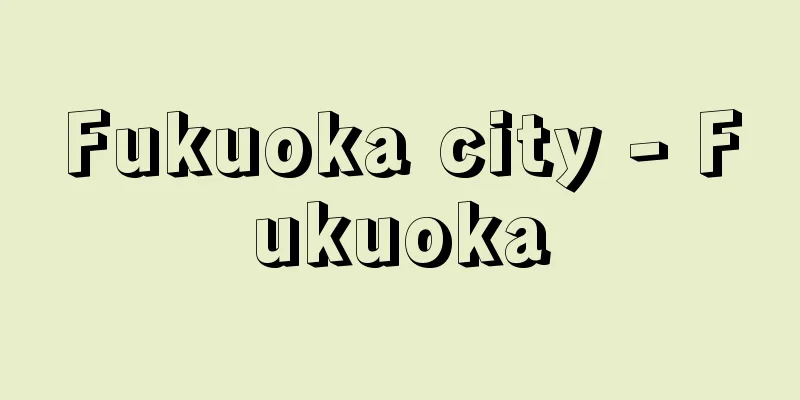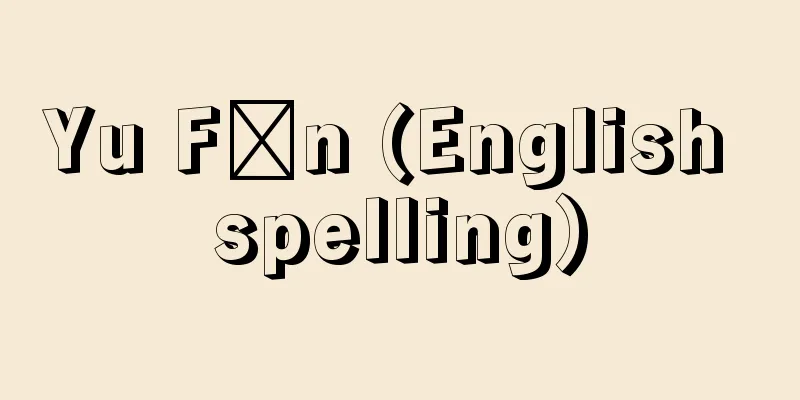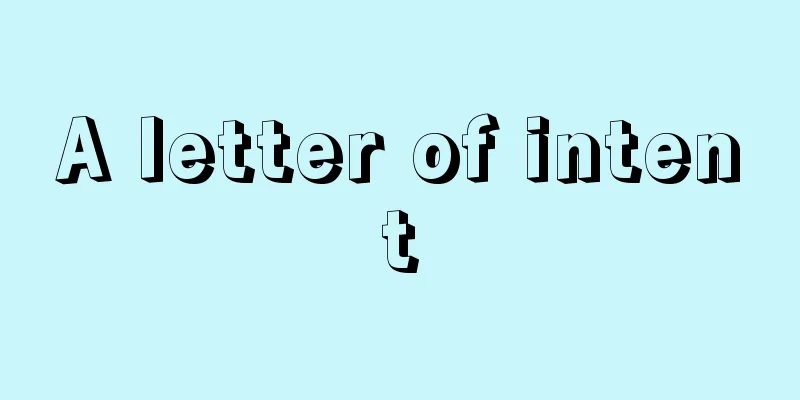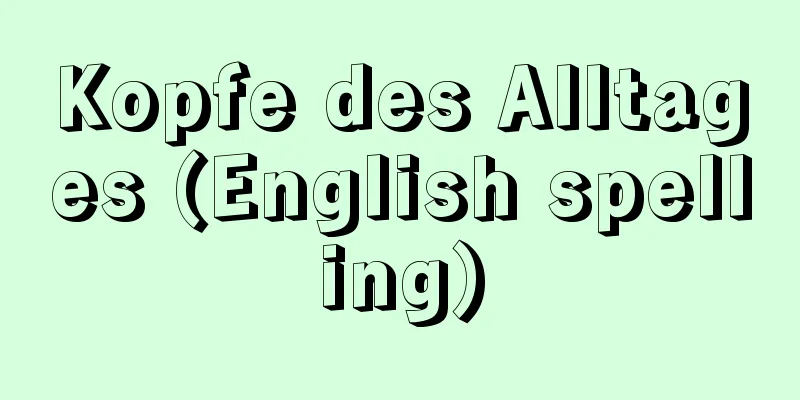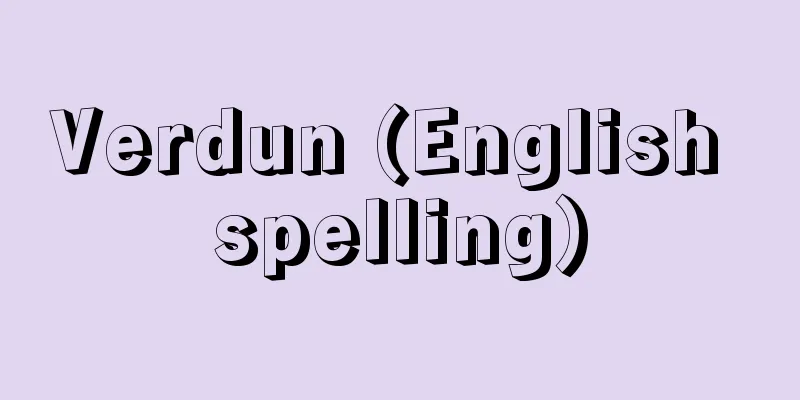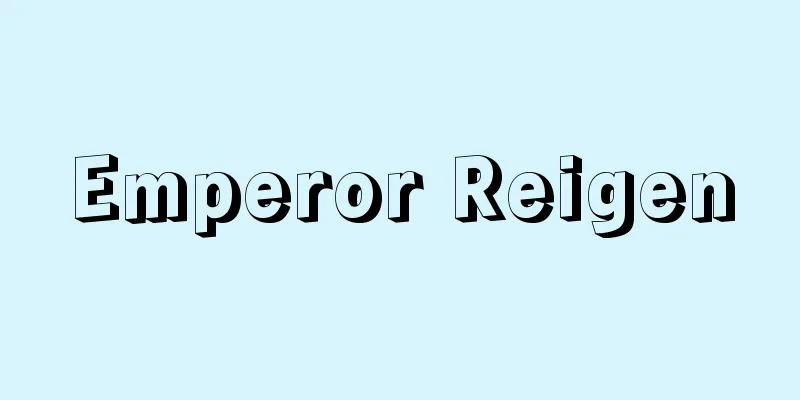French Communist Party (English spelling) Parti communiste français
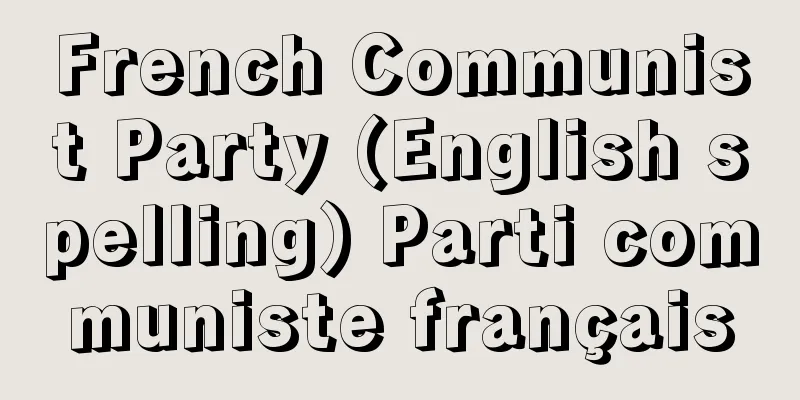
|
Abbreviated as PC, this political party was founded in 1920 by members of the French Socialist Party who supported joining the Third International, and is one of the largest communist parties in Western Europe. At the start of World War I, the pacifist opposition within the Socialist Party, which was very small in number and opposed the policy of the Socialist Party leadership to cooperate with the war effort, grew in number as the war dragged on, and grew to become the majority at the National Conference in July 1918. After the war, the anti-war and pacifist faction was influenced by the Russian Revolution and leaned towards Bolshevism. At the Tours Party Congress in 1920, the pro-Bolshevik forces within the party, led by General Secretary Frossard and Editor-in-Chief of Humanité Cachin, finally accepted Comintern's 21-point conditions for joining Comintern, passed a vote with overwhelming support of about two-thirds, and founded the Communist Party, while the minority remained in the Socialist Party. The Communist Party gained control of 110,000 of the 150,000 party members and the party's newspaper, Humanité, but only 13 of the 68 members of the National Assembly joined the new party, and the party's influence rapidly weakened due to fierce internal struggles between the right wing (the newspaper's editor-in-chief Fabre, the poet Pioc, Bellefeuille, etc.), the center wing (Frossard, Cachin, etc.), and the left wing (Baillant-Couturier, Dunois, Souvarine, etc.). In 1924-1925, the party was "Bolshevikized" with the aim of creating a centralized party system based on "cells" (remote organizations formed in regions and workplaces), and struggles against the Ruhr occupation and the Rif War were also carried out. The ultra-left "class against class" tactics that began in 1927 further weakened and isolated the party, leading to a crushing defeat in the 1928 general election, for which the responsibility for these was placed on the "Barbe-Sérolles group." Meanwhile, Thorize, who became Secretary-General of the party in 1930, consolidated his regime by defeating his rival, Driot, and in 1936, he established an alliance with the Socialist Party and the Radical Party, known as the Popular Front, and won a landslide victory in the general election, regaining the party's influence in one fell swoop. However, the signing of the German-Soviet Non-Aggression Pact and the imminent outbreak of World War II led to the outlawing of the Communist Party, and the party fell into disarray. However, with the start of the German-Soviet War, the Communist Party joined the Resistance in large numbers, and the party's influence, which had been concentrated in urban areas, grew nationwide. After the war, the Communist Party's influence grew rapidly, and in the 1945 general election it became the largest party and sent ministers to the government, but in May 1947, when the Cold War began, the Communist Party's ministers were dismissed from the Ramadier cabinet. After that, the party's influence declined for a long time after the criticism of Stalin and the establishment of the Fifth Republic, and in 1964 Secretary-General Thorize, who had dominated the party for many years, passed away. He was succeeded by the reformist Waldek Rocher, who aimed to form an alliance with the Socialist Party and to liberalize the party, but the "May Events" of 1968 and the Soviet military intervention in Czechoslovakia shook his leadership, and in 1969 he was succeeded by Georges Marché due to "illness" (Rocher formally resigned in 1972). The active and outgoing new Secretary-General, supported by two capable reformist theorists, Fitelman and Canapa, was initially very popular, but the wall of conservative Stalinists within the party, backed by the Communist Party of the Soviet Union, was thick, and the party's opponents and reformists, such as the intellectual group including Roger Gallodi, and former Resistance fighters including Charles Tillon, harshly criticized the party executive, leading to repeated expulsions. Marche's moderate party executive managed to sign a joint Socialist-Communist platform in June 1972, one year after the birth of the new Socialist Party (led by Mitterrand), and in 1976 abandoned the "dictatorship of the proletariat" to create a trend toward Western European Communist parties and Eurocommunism, while also distancing itself from the Communist Party of the Soviet Union. However, it then stepped up its attacks on the Socialist Party, leading to the collapse of the left-wing coalition in 1977. From this time onwards, it adopted neo-Poujadist and nationalistic policies domestically, while at the same time supporting the Soviet intervention in Afghanistan and hastily taking steps to repair relations with the Soviet Union, which sparked an outpouring of criticism within the party. Marche tried to silence criticism of the executive from within the party by Erenstein, Althusser, Fizban and others, but the whirlpool of criticism swept through the party. Marchais's share of the vote in the first presidential election in 1981 dropped significantly, clearly demonstrating the strength of criticism from both within and outside the party, and the party was forced to offer its unconditional support for Mitterrand in the second election, and Mitterrand was elected president. In the general election that followed, the Communist Party saw a significant drop in its share of the vote and the number of seats, while the Socialist Party won a landslide victory by winning a majority of the seats in the National Assembly on its own. However, the party accepted the Communist Party's request to sign a "Government Policy Agreement" and appointed four Communist Party ministers to the cabinet. However, the Communist Party continued to lose support to the Socialist Party, so it began to criticize the party again, and in 1984 the Communist Party ministers left the cabinet. The collapse of the socialist countries of Eastern Europe and the Soviet Union further worsened the party's decline, but the Marchais system endured until 1994, when it was succeeded by the new Secretary General Robert Hu. In the 1997 general election, in which the left won, they elected 37 members of parliament, and sent three ministers to the government led by Jospin that was established as a result of this victory. However, after this peak, the Communist Party's influence rapidly declined. After the 30th Party Congress in March 2000, the left wing left the party, and in the local elections in March 2001, the party lost its regional strongholds, which had long been its stronghold, to the conservative faction. Even after Marie-Georges Buffet (1949-) became the first female national secretary in October of the same year, the party's decline continued, and it suffered crushing defeats in the 2002 presidential and general elections. The reasons for this decline were challenges from the far-left, such as the Workers' War and the Revolutionary Communist League, and the loss of supporters in industrialized urban areas to the far-right National Front. The party also contained left and right factions within itself, and it was unable to decide on a coalition policy with the Socialist Party, leading to financial difficulties. The final stopgap measure that has finally emerged is the establishment of electoral cooperation with various left-wing factions. Although this had some effect in the 2004 regional elections and the 2007 general election, it is still far from a complete recovery. [Kenichi Yokoyama] "The Political Sociology of the French Communist Party, Part 1" by Annie Kriegel, translated by Kenichi Yokoyama (1982, Ochanomizu Shobo) " "History of the French Communist Party" by Takashi Umihara (1967, Gendai no Rironsha) [References] | |Source: Shogakukan Encyclopedia Nipponica About Encyclopedia Nipponica Information | Legend |
|
略称PC。1920年にフランス社会党第三インターナショナル加盟賛成派が結成した政党で、西ヨーロッパの最大の共産党の一つ。 第一次世界大戦開戦当時ごく少数だった社会党指導部の戦争協力政策に反対する党内の平和主義的反対派は、戦争が長引くにしたがって数を増し、1918年7月の全国協議会で多数派になるまでに成長した。戦後、反戦平和派はロシア革命の影響を受けてボリシェビズムへと傾斜していった。党書記長フロッサールと、『ユマニテ』編集長カシャンらに率いられた党内親ボリシェビキ勢力は、ついに1920年のトゥール党大会で、コミンテルンの21か条の加入条件を受け入れ、コミンテルンへの加入を約3分の2の圧倒的支持で可決させて共産党を創立し、少数派は社会党に残った。共産党は約15万の党員中の11万と党機関紙『ユマニテ』を手中にしたが、国会議員68名中13名しか新党に加入せず、また右派(新聞主幹ファブル、詩人ピオック、ベルフィユら)、中間派(フロッサール、カシャンら)、左派(バイアン・クチュリエ、デュノア、スバリヌら)の間の党内闘争が激しく展開されたために急速に党勢は衰えた。1924~1925年には「細胞」(地域や職場などでつくられた末端組織)を組織の基礎とし中央集権的党体制づくりを目ざす「ボリシェビキ化」が行われ、また反ルール占領闘争やリフ戦争に反対する闘争が展開された。1927年に始まる極左的「階級対階級」戦術はいっそうの党の弱体化と孤立化とをもたらし、1928年の総選挙で惨敗したが、これらの責任は「バルベ・セロル・グループ」に帰せられた。一方、1930年に党書記長になったトレーズは、ライバルのドリオを退けて体制を固め、1936年には社会党・急進党らと人民戦線と称される提携関係を樹立して総選挙に大勝し、党勢力を一挙に盛り返した。しかし独ソ不可侵条約締結と第二次世界大戦の切迫は共産党の非合法化をもたらし、党は混迷を極めたが、独ソ戦の開始によって共産党は大挙レジスタンスに参加し、かつて都市部に集中していた党勢力は、全国的規模をもつに至った。戦後、共産党の勢力は急成長し、1945年の総選挙では第一党になり政府に閣僚を送り込んだが、冷戦が開始した1947年5月に、共産党の大臣はラマディエ内閣から解任されるに至った。その後スターリン批判や第五共和政の成立を経て党勢は長期にわたって低落し、1964年には長年、党に君臨したトレーズ書記長が死去した。彼の跡を改革的なワルデク・ロシェが継ぎ、社会党との提携と党内の自由化を目ざしたが、1968年の「五月事件」とソ連のチェコへの軍事介入によって彼の指導体制が揺さぶられ、1969年には「病気」のためジョルジュ・マルシェが後継者となった(ロシェは1972年に正式に辞任)。フィテルマンとカナパという2人の有能な改革的理論家に支えられた、活動的で外向的な新書記長の人気は当初高かったが、ソ連共産党の後押しを受ける党内の保守的なスターリン主義者の壁は厚く、ロジェ・ガロディら知識人党員グループや、シャルル・ティヨンら旧レジスタンス闘士などの党内反対派・改革派は党執行部を厳しく批判し、除名が繰り返された。 党内中間派のマルシェ党執行部は、新生社会党(党首ミッテラン)誕生から1年後の1972年6月に社共の共同綱領の調印にこぎ着け、1976年には「プロレタリア独裁」も放棄して西ヨーロッパ共産党とユーロコミュニズムの潮流をつくりだし、ソ連共産党と距離を置く姿勢を強めるが、その後社会党への攻撃を強めたため、1977年左翼連合は決裂した。このころから国内ではネオ・プジャード的、民族主義的政策をとり、一方でソ連のアフガニスタン介入を支持し、急遽(きゅうきょ)ソ連との関係修復へと歩みだすと党内での批判が噴出した。マルシェはエランスタン、アルチュセール、フィズバンらの党内での執行部批判を封じようとしたが、批判の渦は党内を席巻(せっけん)した。1981年の第1回大統領選挙でのマルシェの得票率は大幅に後退して党内外の批判の強さが如実に示されると、第2回選挙でのミッテラン無条件支持を打ち出さざるを得なくなり、ミッテランは大統領に選出される。直後の総選挙で共産党が得票率と議席数を大幅に後退させる一方で、社会党は国民議会の過半数の議席を単独で制し圧勝したが、共産党の「政府政策協定」調印要求を呑(の)んで4人の共産党閣僚を入閣させた。しかし社会党に支持層を奪われ続けた共産党は社会党への批判をふたたび開始し、1984年に共産党閣僚は離脱する。その後東欧社会主義諸国とソ連の崩壊によって、党勢の退潮に追い打ちをかけられたが、1994年までマルシェ体制はもちこたえたあと、ロベール・ユー新書記長に引き継がれた。左翼が勝利した1997年総選挙では37人の議員を当選させ、この勝利で樹立されたジョスパン政権には3人の閣僚を送った。 しかしこの時を頂点として共産党の党勢は急速に衰えていく。2000年3月の第30回党大会のあと、左派が党を離れ、2001年3月の地方選挙では長い間党の地盤であった地方都市を、保守派に奪われていった。同年10月にマリー・ジョルジュ・ビュッフェ(1949― )が初の女性全国書記となった後も凋落(ちょうらく)の傾向は変わらず、2002年大統領選と総選挙では惨敗を喫した。その衰退の原因は、極左派からは「労働者の戦い」「革命的共産主義者同盟」などの挑戦を受けたこと、極右派の国民戦線には工業化された都市部で支持者を奪われたことである。また党内にも左右各派を抱え、社会党との連立政策も定まらず、財政難に陥った。ようやくみえてきた最後の弥縫(びほう)策は、左翼諸派との選挙協力の構築で、2004年地域圏(レジオン)選挙や2007年総選挙で多少の効果をあげたものの、完全な立ち直りにはほど遠い。 [横山謙一] 『アニー・クリエジェル著、横山謙一訳『フランス共産党の政治社会学 第一部』(1982・御茶の水書房)』▽『海原峻著『フランス共産党史』(1967・現代の理論社)』 [参照項目] | |出典 小学館 日本大百科全書(ニッポニカ)日本大百科全書(ニッポニカ)について 情報 | 凡例 |
<<: Bank of France - French (English) Banque de France
>>: French Revolution - French (English) Révolution française
Recommend
Balenciaga - Balenciaga (English spelling) Christobal Balenciaga
Spanish-born fashion designer. One of the most re...
Caesar's Dictatorship - Returning to the Troublesome
...A "revolutionary dictatorship" corre...
Massage Therapy - Massage Therapy
...Along with Anma and Massage, it is one of the ...
IUPS - Internet Up and Down Services
International Union of Physiological Sciences . Fo...
Pieta (English spelling) Pietà Italian
In Christian art, this is a devotional image of t...
Bud scale - Garin
〘 noun 〙 A scale-like organ that covers the winter...
Ashigara Pass - Ashigara Pass
A checkpoint established on the ancient official r...
Betting -
〘 noun 〙 The act of gambling. Also, the item that ...
Anthurium scandens (English spelling)
… [Takabayashi Masatoshi]. … *Some of the termino...
Trjavna
… Under the Ottoman Empire, which lasted for abou...
Cellulose acetate butyrate
It is also called acetate butyrate cellulose. It i...
Hafiz-i Abrū (English spelling)
?-1430 A Timurid historian. Born in Herat or Haf, ...
smaze
…Rain washes away the fine particles in the air, ...
Seaweed wine - Kaisoushu
...Therefore, the technique of steeping medicinal...
Crucifixion Mozaemon
A legendary righteous man from the early modern p...
